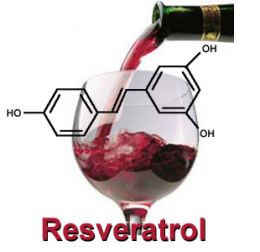A lot of supplements sold online don’t have any medical research to support their claims. Resveratrol’s problem is that there is medical research to back up almost any claim you want to make about it. This organic compound found in red wine is supposed to help you fight aging, cancer, high blood sugar, Alzheimer’s, and inflammations, without having to change your diet or eat your vegetables. It’s a miracle! Or maybe it’s just a matter of miscommunication. Singularity Hub would like to walk you through the basics of resveratrol and help you decide if it’s full of hope or hype.

If a single supplement could do everything that resveratrol experiments suggest it can, you can bet everyone would be clamoring to take it. And many are. You can’t type ‘reserveratrol’ into a search engine without being bombarded by ads, and I’m guessing one or two may appear on this page right now. Before you buy you should ask yourself two questions: will this company actually be selling me a supplement containing reserveratrol? If so, would it actually improve my health?
How did we get to resveratrol?
It turns out the real fountain of youth is a lack of apetite. In the 1930s Crowell and McCay at Cornell University discovered that feeding mice less food helped them live longer. This calorie restrictive diet got everyone thinking about how to reverse the affects of aging. Coincidentally, resveratrol was first isolated as a substance in the roots of the white hellebore soon after in 1940.
So people knew that eating less food while still receiving the proper nutrients kept you alive. It also helped slow all the major problems of aging. The problem is that the most restrictive method of reducing caloric intake is called starving and it has a pesky side effect called death. Diets high in fruits and veggies and low in meats and sugars do get close to the conditions that can produce longevity (as we see in the world’s blue zones). Most people, however, would rather die young than give up meats and sugars, so scientists started looking for a way to mimic calorie restriction without actually eating less.
You really can’t talk about resveratrol without mentioning the French Paradox. Back in the early 90s, Dr. Serge Renaud proposed that the reason that the French could consume a diet high in fats, but have low instances of heart disease was due to drinking red wine. When 60 Minutes ran the story of Renaud’s work US red wine sales jumped more than 40%. Renaud, many supposed, had hit upon the jackpot: eat all the fat you want, just drink red wine and you’ll be fine.
Turns out that red wine contains a fairly high concentration of resveratrol, up to 13 mg/L. In 2003, Dr. David Sinclair from Harvard Medical School demonstrated that high doses of resveratrol extended the lifespan of yeast by 70%! In 2006 he saw that resveratrol allowed mice on a high fat diet to be as healthy as mice on a normal diet – mimicking the supposed French Paradox. It was the first paper, published in Nature, that really got the modern resveratrol movement off the ground. His work has been cited by many of the companies selling supplements online. Of course, most of the quotes accredited to Sinclair are complete fabrications, as he stated unequivocally to Business Week. Misquoting celebrities is just good marketing though, right?
Before Sinclair, work had been done at the University of Illinois linking topical applications of resveratrol to fighting cancer in mice (Jang et al, 1997), but after Sinclair things really got going. Reports were published that resveratrol could help fight cancers of various kinds, diabetes (Palsamy et al, 2008), and even plaque buildup on the brain (Karuppagounder et al, 2008). It officially became the miracle drug.

How it works exactly, depends on who you ask. Its active mechanism has been supposed to be increased testosterone, increased estrogen, reduction of free radicals and even decreased copper. Sinclair and others, however, have highlighted resveratrol’s affect on the ‘SIRT1’ genes. While the exact nature of SIRT (silent mating type information regulation) genes isn’t fully understood, they seem to code for proteins that help your cells with DNA problems. A study of adults in Finland (weird, huh?) seemed to indicate that active SIRT1 genes increased metabolic efficiency (Lagouge et al, 2006) – again mimicking the benefits of that calorie restriction diet.
Ok, but should I buy it? Ask the mice.
Of the dozens of scientific papers that have been peer reviewed and published, none have conclusively shown that resveratrol causes longevity in humans. Proving that would theoretically take 80 years or so. Most work has been done on yeast, mice, worms, and other short lived animals. Even the other ‘miraculous effects’ of resveratrol (anti-cancer, anti-diabetes, etc) haven’t been shown to translate to humans (though some research is in clinical trial right now). Sinclair and his team are concentrating on many different ways to stimulate the SIRT genes, resveratrol being only one avenue.
And remember the French Paradox? Well, it turns out that Renaud’s number may have been off a little. Follow up studies on heart disease in France suggest that there may be comparable levels of heart disease as in other countries. In fact, most of the perceived certainties about red wine and resveratrol still need to be verified. Scientific studies have to be repeated and independently confirmed before you should rely upon them.
Even if reservatrol would work as well in humans as it does in mice, worms, etc, there still remains the problem of getting enough of it into your system. Most researchers estimate that it would take 3-5 grams per day, that’s a lot of pills, to reproduce the effects seen in mice. But pills just won’t work for humans. Resveratrol doesn’t move around your system very easily and it is quickly metabolized by your liver and intestines. Getting concentrations high enough to do you any good may involve topical gels, or injections.
The problem is that similar to genetic testing, stem cells, and other ‘miracle’ technologies, people are trying to purchase before science is ready to sell. That leaves consumers open to charlatans. I’m not saying that the claims about resveratrol will never be proven true, I’m just saying it hasn’t happened yet. Until a proven longevity pill hits the market I’m going to stick to eating right, getting exercise, and avoiding stress. They may not sell that on the internet, but it still works.


